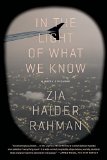Summary | Excerpt | Reviews | Beyond the Book | Readalikes | Genres & Themes | Author Bio

Critics' Opinion:
Readers' Opinion:
First Published:
Apr 2014, 512 pages
Paperback:
Feb 2015, 512 pages
 Book Reviewed by:
Book Reviewed by:
Poornima Apte
Buy This Book
All the same, it is not guilt alone that brings me to my desk to put pen to paper and reckon with Zafar's story, my role, and our friendship. Rather, it is something that no single word can begin to describe but which, I hope, will take form as I carry on. All this is quite fitting, really—how it ought to be—when I call to mind the subject of my friend's long-standing obsession. Described as the greatest mathematical discovery of the last century, it is a theorem with the simple message that the farthest reaches of what we can ever know fall short of the limits of what is true, even in mathematics. In a sense, then, I have sat down to venture somewhere undiscovered, without the certainty that it is discoverable.
* * *
When he stood before me on the doorstep of our home, my disheveled friend uttered the name of Gödel clearly and correctly, and I recalled instantly the bright afternoon of a Sunday in New York when I suggested to Zafar that I had caught up with him mathematically. I had assumed that Zafar's grasp of mathematics must have slipped, for after taking a first-class degree at Oxford, he left the study of mathematics entirely, quite to everyone's surprise, to study law at Harvard, while I, on the other hand, after completing my third year and then taking a year off, continued with graduate studies in economics and applied mathematics.
My suggestion to him, as we walked along a tree-lined street in Greenwich Village on that Sunday all those years ago, invited from him what seemed then the cryptic response that mathematics was full of beauty. I felt compelled to ask what he considered the most beautiful mathematics he had come across, and perhaps that is what he had intended, that I ask this question—I cannot tell. Gödel's Incompleteness Theorem was his unhesitating answer, and though I remembered the statement of the theorem well enough, I nevertheless failed to perceive why he regarded it as particularly beautiful. Within any given system, there are claims which are true but which cannot be proven to be true. So states the theorem. So simple. In its implications, it is a shocking theorem, granted, and some time later, that is to say in the weeks following his sudden reappearance on our doorstep, years after that July day in New York, Zafar would explain to me in simple terms why Gödel's Incompleteness Theorem mattered so much to him and why, if I may be allowed to interpose my own view, the world was foolish to ignore it in an age of dogma.
Walking with him down that New York street, I thought to myself that perhaps such beauty, as he perceived, might lie in the theorem's proof rather than in the statement itself. Yet I could not recall the proof of Gödel's disturbing result—I am not sure I ever knew—and I assumed that after his departure from mathematics some years before, Zafar would also have lost all memory of it. I was wrong, of course, for when I prompted him, he began in the manner of an excited child to describe an argument, setting down apparently irrelevant pieces of the puzzle in all its corners. Barely a few such pieces had been laid, before the fragmentary image of a proof reared up toward me. I caught something then of beauty, unfortunately a beauty so nascent that I cannot tell if I had truly seen it or if I had merely been carried away on my friend's euphoria. Presently his animated exposition was interrupted when we ran into a colleague and, so to speak, lost our way.
We had many walks on the streets of New York, a city to which I returned on business nearly every month, and in the streets of London later. Many of those walks abide in the memory, but if any of them stand out from the rest, then a good claim may be made by two others.
The first was near Wall Street, and, while arguably of little consequence insofar as Zafar's story goes, it remains a fond memory for me, despite present circumstances. For the better part of the walk, my friend coached me, helping me to commit to memory a poem by e. e. cummings, somewhere i have never travelled, as he discussed its rhythms and cadences and parsed its images into a sequence. His memory held a prodigious store of poetry, and this poem was his answer to my request for something with which I could woo the woman who was to become my wife.
Excerpted from In the Light of What We Know by Zia Haider Rahman. Copyright © 2014 by Zia Haider Rahman. Excerpted by permission of Farrar, Straus & Giroux. All rights reserved. No part of this excerpt may be reproduced or reprinted without permission in writing from the publisher.





The Funeral Cryer by Wenyan Lu
Debut novelist Wenyan Lu brings us this witty yet profound story about one woman's midlife reawakening in contemporary rural China.
Your guide toexceptional books
BookBrowse seeks out and recommends the best in contemporary fiction and nonfiction—books that not only engage and entertain but also deepen our understanding of ourselves and the world around us.